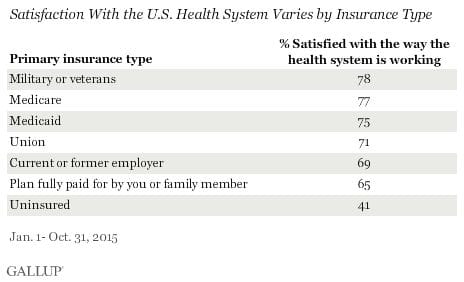Amid Popularity, Single-Payer Health Care Appears on More Ballots Nationwide
Enough signatures were collected in Colorado this month (with more than 60,000 to spare) to place a $25 billion tax increase on the ballot in 2016 to pay for a single-payer type insurance for the whole state.
Vermont passed a similar measure several years ago, but lacked a funding mandate for the program, which has been derailed by politicians refusing (or at least stalling) on paying for the ballot-approved measure.

Single-payer insurance was supposed to be one of the hallmark traits of the Obamacare package, yet was stripped from the legislation to make the bill more "palatable" for passage.
Why is single-payer insurance still gaining momentum?
In certain political ilks, just the mere mention of it is the political kiss-of-death, yet one fact remains--Americans who already have it, largely like it.
A recent Gallup study indicated that those with government insurance plans were the most satisfied with the way the health care system worked for them.
The ten-month study, from Jan. 1 to Oct. 31 2015, concluded:
Gallup
This result is incredible, especially considering the numerous scandals pertaining to veterans benefits that have circulated in recent years.
While certainly not politically popular by all, it's time we accept the fact that an enormous portion of Americans are already on single-payer health care (Medicare, Medicaid, and military), the system works, and it could work for everyone.Medicare is the standard by which single-payer "should" be measured--everyone gets a basic health care package, but it is up to the participant what type of co-insurance to purchase and how much. This still allows for considerable personal choice in the system, while guaranteeing a base minimum.
Obamacare relied on the states to approve medicaid expansion, something many states have been reluctant to do. This leaves some of the nation with complete access to health care while others are left without.
Politicians have been leery of Medicaid expansion because of the price tag. Obamacare does not provide the funds for this expansion after the first initial push.
But here's where the case in Colorado is interesting -- voters will be casting their ballots for a program with mandated funding, both for the initial and subsequent funding of the program.
Considering Vermont's failure over single payer, Colorado will become the new case study on whether or not this really could succeed. As with most programs, once the wrangling over the purse is eliminated, the program usually has a good chance.



